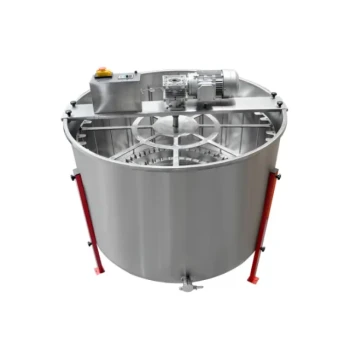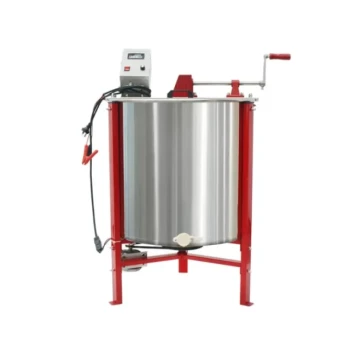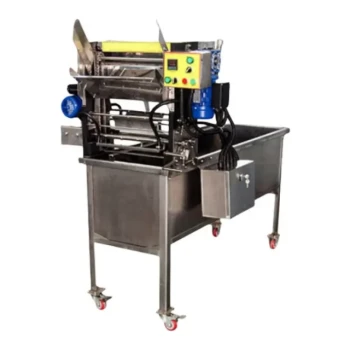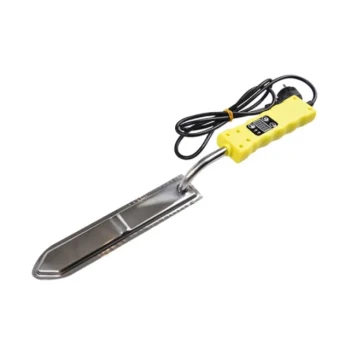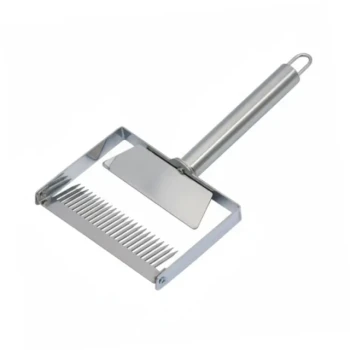The primary machine used to extract honey from a honeycomb is called a honey extractor. This device uses centrifugal force to spin honey out of the comb's cells without destroying the delicate wax structure. This allows the bees to repair and reuse the comb, saving them an immense amount of energy.
While a mechanical honey extractor is the central tool, successful honey harvesting is a complete process. Your choice of equipment and method depends entirely on the scale of your operation, from a single hobbyist hive to a commercial apiary.
How a Honey Extractor Works
A honey extractor is fundamentally a large drum containing a basket that holds the frames of honeycomb. Spinning this basket, either with a hand crank or an electric motor, generates powerful centrifugal force that flings the liquid honey outward against the drum's inner wall.
The Critical First Step: Uncapping
Before a frame can be placed in an extractor, the wax caps that bees build to seal each honey-filled cell must be removed. This is called uncapping.
Beekeepers typically use a specialized heated or cold uncapping knife or an uncapping fork to gently slice or scratch off these wax cappings, exposing the honey underneath.
The Principle of Centrifugal Force
Once uncapped frames are loaded into the extractor's basket, the spinning motion forces the honey out. It slides down the interior walls of the drum and collects at the bottom.
A spigot, or "honey gate," at the base of the extractor allows the raw honey to be drained out for filtering and bottling.
The Core Benefit: Preserving the Comb
The greatest advantage of using an extractor is that it leaves the honeycomb almost entirely intact. Bees expend a tremendous amount of resources and energy to build wax comb.
By returning the empty "wet" combs to the hive, beekeepers give their bees a massive head start on the next honey flow, leading to a healthier and more productive colony.
Types of Honey Extractors
Extractors come in several designs, each suited for different needs and scales of beekeeping. The main distinction is how they position the frames.
Tangential Extractors
In a tangential extractor, the frames are placed with one side of the comb facing outward. This design extracts honey from one side of the frame at a time.
Halfway through the process, the beekeeper must stop and flip each frame to extract the other side. These are often manual, hand-cranked machines and are popular with beginners due to their simplicity and lower cost.
Radial Extractors
In a radial extractor, frames are positioned like the spokes of a wheel, with the top bar of the frame facing outward.
As the machine spins, honey is pulled from both sides of the comb simultaneously. This design is far more efficient and is the standard for larger hobbyist and commercial operations. They can be manual but are most often motorized.
Understanding the Trade-offs
A honey extractor is not the only way to get honey from a comb. The method you choose involves clear trade-offs between cost, efficiency, and the preservation of the comb.
The Extractor Method
- Pro: Highly efficient and preserves the valuable honeycomb for the bees to reuse.
- Con: Requires an upfront investment in a machine that can be costly and requires storage space.
The Crush and Strain Method
- Pro: Requires no special equipment beyond a bucket and a filter (like a sieve or cheesecloth). You simply crush the entire comb and strain the honey from the wax.
- Con: This method completely destroys the comb, forcing the bees to start from scratch. It is far less efficient and more labor-intensive for the beekeeper and the bees.
Cut Comb Honey
- Pro: This method involves cutting sections of the sealed honeycomb to be packaged and sold as-is. It is a premium product that requires no extraction at all.
- Con: This is not a method for producing liquid honey, but rather for creating a different type of product entirely.
Making the Right Choice for Your Goal
The best honey extraction method is the one that matches your beekeeping goals and the number of hives you manage.
- If your primary focus is a few hobby hives: A manual tangential extractor or the simple crush and strain method is your most practical starting point.
- If your primary focus is managing a growing apiary: A radial extractor will save you significant time and labor, justifying the investment.
- If your primary focus is maximum efficiency at a commercial scale: A large, motorized radial extractor is the undisputed industry standard.
Understanding these tools and techniques empowers you to choose the right approach that aligns with your budget, scale, and beekeeping philosophy.
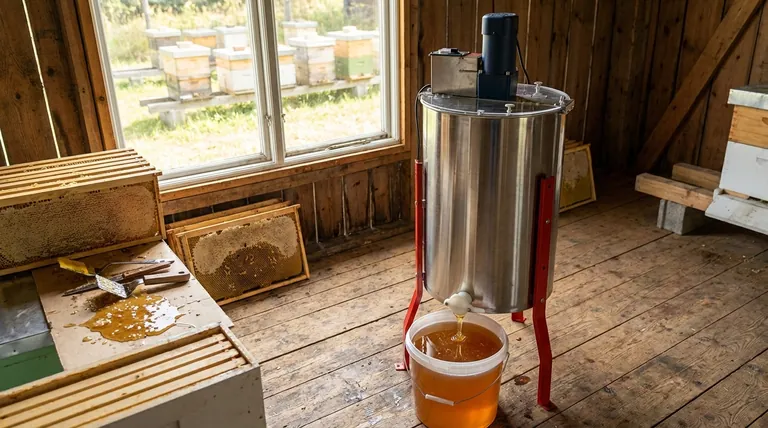
Summary Table:
| Extractor Type | Best For | Key Feature |
|---|---|---|
| Tangential | Hobbyists / Beginners | Manual crank; extracts one side at a time |
| Radial | Growing / Commercial Apiaries | Motorized; extracts both sides simultaneously |
| Crush & Strain | Minimal Equipment Needs | No machine required, but destroys the comb |
Ready to maximize your honey yield and hive health?
At HONESTBEE, we supply durable, high-efficiency honey extractors and a full range of beekeeping equipment designed for the demands of commercial apiaries and beekeeping equipment distributors.
Our wholesale-focused operations ensure you get the reliable tools you need to streamline your harvest and support your colonies. Let's discuss the best equipment solution for your scale.
Contact our expert team today for wholesale pricing and recommendations.
Visual Guide
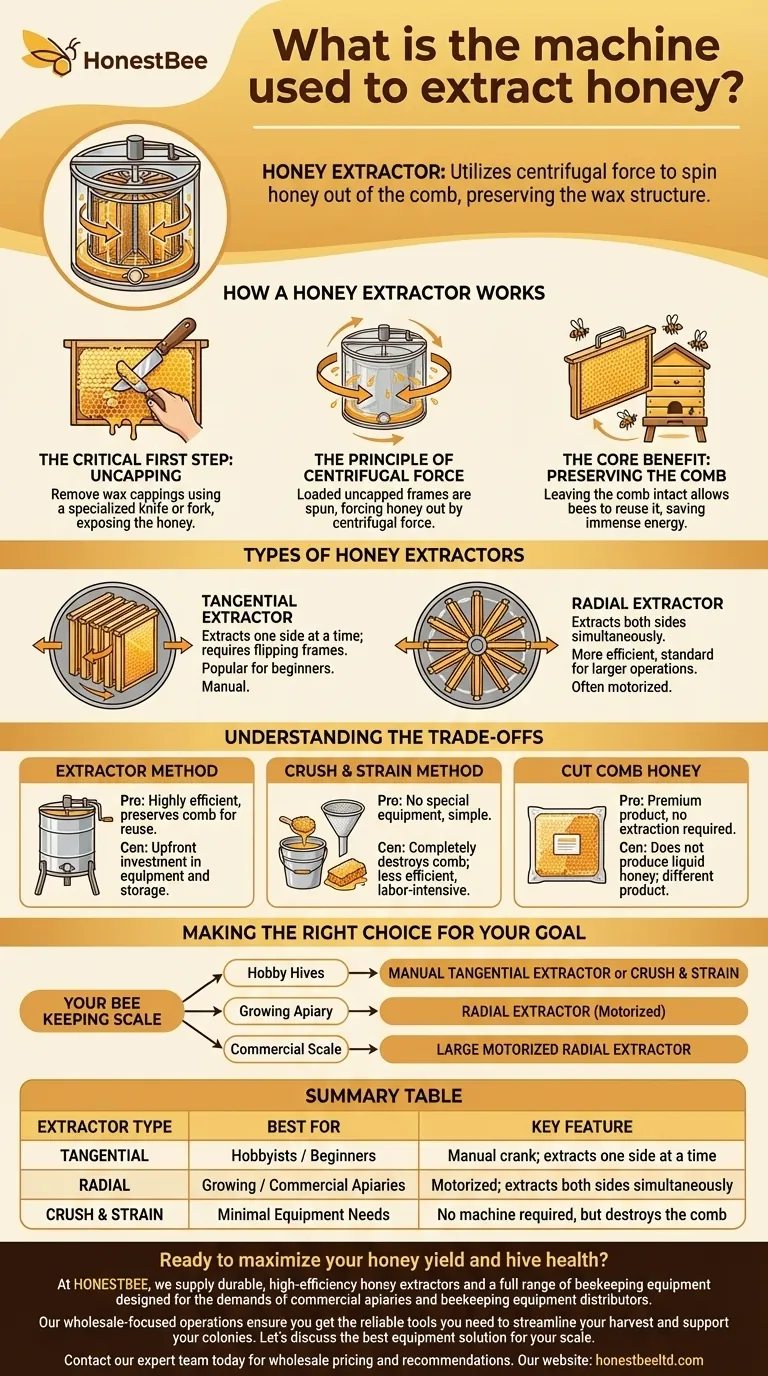
Related Products
- electric honey extractor honey centrifuge 3 frame honey extractor stainless steel honey frame extractor
- 8-Frame Electric Self-Reversing Honey Extractor Spinner for Commercial Honey Extraction Equipment
- Electric 8 Frame Honey Spinner Extractor Equipment for Beekeeping
- 40 Frame Commercial Electric Honey Extractor for Beekeeping
- 2 Frame Stainless Steel Manual Honey Spinner Extractor for Beekeeping
People Also Ask
- How does a mechanized honey extractor function? Boost Your Harvest with Centrifugal Technology
- What is the primary function of a mechanical Honey Extractor? Boost Apiary Efficiency with HONESTBEE Solutions
- How to extract honey by hand? A Guide to Crush & Strain vs. Manual Extractors
- What is the function of a 4-frame horizontal honey extractor? Maximize Yields and Efficiency for Your Apiary
- What is a churn staff honey extractor and how does it operate? Mastering Traditional Rock Bee Honey Harvesting
- How do labor and time considerations affect the choice between electric and manual honey extractors? Efficiency Guide
- What factors should be considered when choosing a honey extractor machine? Maximize Your Harvest Efficiency
- What are the primary differences between motorized and mechanical honey extractors? Choosing the Best for Your Apiary



